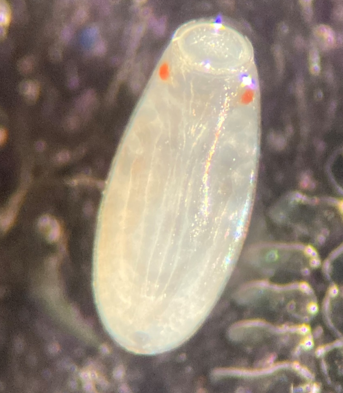Morgan Wilson: Preventing bed bugs and other pests in urban environments

The following story was written in December 2023 by Kelsey Briggs in ENGL 4824: Science Writing as part of a collaboration between the English department and the Center for Communicating Science.
What could possibly be worse than an infestation of bed bugs?
An infestation of bed bugs that are resistant to all our commonly used insecticides — which, unfortunately, is nearly all bed bugs in the United States.
Fortunately, Morgan Wilson is a specialist when it comes to determining methods to eliminate pests in human structures. With a background in pest management, she has primary experience with how the pest control industry functions in urban environments.
Now working in the Dodson Urban Pest Management Laboratory in Virginia Tech’s Department of Entomology with a focus on bed bug management, Wilson’s current research evaluates the embryonic biology of bed bug eggs. Eggs are the most difficult stage of life to treat, she says, and the demographics that bed bugs affect the most in the United States are the elderly and disabled.
Wilson is also studying the labor and economics of alternative pesticide treatments for bed bugs. She hopes that by studying the development of bed bug eggs, she can determine the vulnerabilities they might have with respect to different insecticides. She is also interested in alternative management practices for treating bed bugs.
Like German cockroaches, Wilson notes, bed bugs have developed an insecticide resistance. In the United States, most bed bugs susceptible to insecticides have already been eliminated, and current populations are resistant to common household bug sprays and products. An overreliance on pyrethroids, an active ingredient in household products, has contributed to the problem, Wilson says.
Wilson is exploring alternatives to pesticide use, including biological control treatments and fumigation techniques. Fumigation is a common practice in states such as Florida and California but is not as commonly used in Virginia. It does, however, eliminate an entire household bed bug infestation with a one-time treatment, avoiding the need to re-treat the same household multiple times.

But treatments like fumigation can be labor-intensive and costly, Wilson says. She emphasizes the need to adapt strategies from a methodology known as “integrated pest management.”
Integrated pest management is a methodology widely practiced in agricultural pest control. Farmers or private applicators assess the pests on their crops. Once they know what pest they are dealing with through surveying, along with determining its numbers and the stage of life it is currently in, they know what treatments, insecticides, and prevention methods to use. This allows for minimal crop losses from the pests, a reduction in cost for treatments, and protection of the environment.
Wilson focuses on the assessment of pest populations in urban homes and applies integrated pest management to these settings. By assessing the size and life stage of an indoor pest population, she knows whether the right treatment is spraying, vacuuming, or biological controls, among other treatments.
Other factors play a role, too. “If it’s a heavy infestation with a lot of clutter in that household, we can start thinking about fumigation,” Wilson says. While the initial stage of these methodologies is labor intensive, the assessing, reassessing, and effective treatments ensure the complete elimination of the pest from a home.
It is a point of pride for Wilson to go out into the field to solve problems. “I like getting my hands dirty,” she says. Besides going out in the field to research different sealing methods for fumigation and assessment-based protocols in apartment buildings, Morgan is also studying the embryogenesis (embryo formation) of bed bug eggs, starting from oviposition (egg laying) all the way to hatching. By studying the metabolic and respiratory rates of bed bug eggs from start to finish, she can determine what treatments they are susceptible to.
A bed bug egg. Photo courtesy of Morgan Wilson.

Wilson chose this study for her graduate research project because there was not a lot of research on bed bug eggs, despite the egg being the hardest life stage to treat. She is also using products currently available to pest control operators to see which are most effective, hypothesizing that a product’s formulation affects the results. She is examining water-based, oil-based, aerosol, and dust-based formulations, determining which products can penetrate the bed bug egg and affect the embryo.
Wilson hopes that her research will aid in making pest management a public health priority. Pest management is often considered a luxury commodity, with higher-income households able to afford it while it remains an afterthought for lower-income households.
Wilson aims to gain her Ph.D. and join the pest management industry as a technical representative or entomologist with a focus in urban pest management. “Bed bugs impact everyone,” she says, “and will infest anyone no matter their demographic or household.” But with Wilson in the workforce, bed bugs may finally have met their match.


